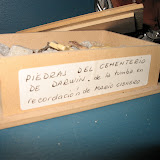malvinas/falklands: islas de la memoria
Yesterday afternoon I went to the Centro Cultural Recoleta in downtown Buenos Aires to see the new exhibition Imagenes Publicas Ojectos Privados: Malvinas Islas de la memoria. (Public Images Private Objects: Malvinas - Islands of Memory) - click on photo below to see more images.
I didn't expect it to be such a tough experience, and at times I was sickened with contrasting emotions.
I felt shame at being seen (for the first time since I've been here) as the enemy, an aggressor country with a pirate history (in Chile the English are referred to as los piratas because of their actions in these waters), a country that had attacked an Argentine ship in disputed circumstance (the sinking of the Belgrano was described as a war crime - thankfully there was no shot of the infamous Sun headline), a country led by the hated Thatcher and in cahoots with the equally hated Reagan, a country accused of mistreating, even killing, prisoners (sound familiar?)
I was confused by side-by-side remembrance of the violent repression of the Argentine military regime and the violence of the war, but with no connection made (unlike in conversations with Argentines).
I bristled a little at any suggestion of Argentine's claim on the islands, or more - since of course Spain, England and Argentina all invaded the islands at some point and none have any natural claim whatsoever - that the preferences of the current inhabitants of the islands should be overlooked.
I grieved for the youthful faces and letters home, the emergency sachets of water (with instructions to drink no water for the first 24 hours and then only mouthfuls at intervals), the soiled boots and bulky overcoats, the mass of flower strewed crosses.
And I was angry at the problems faced by Argentines visiting their loved ones' island graves - their trips dependent on changeable political support.
The accompanying leaflet begins by stating the widely held view of the war as the foolish adventure of a drunken general that turned out to be significant step towards his downfall. But it also notes the continued ambiguity in Argentine-English relationships and the ongoing grief of soldiers and their families.
Nuestro norte está mirando el Sur 'Our north is looking south,' says the poster.
Once more the world turns and my vista reveals another sky.
 |
| islas de la memoria |
I felt shame at being seen (for the first time since I've been here) as the enemy, an aggressor country with a pirate history (in Chile the English are referred to as los piratas because of their actions in these waters), a country that had attacked an Argentine ship in disputed circumstance (the sinking of the Belgrano was described as a war crime - thankfully there was no shot of the infamous Sun headline), a country led by the hated Thatcher and in cahoots with the equally hated Reagan, a country accused of mistreating, even killing, prisoners (sound familiar?)
I was confused by side-by-side remembrance of the violent repression of the Argentine military regime and the violence of the war, but with no connection made (unlike in conversations with Argentines).
I bristled a little at any suggestion of Argentine's claim on the islands, or more - since of course Spain, England and Argentina all invaded the islands at some point and none have any natural claim whatsoever - that the preferences of the current inhabitants of the islands should be overlooked.
I grieved for the youthful faces and letters home, the emergency sachets of water (with instructions to drink no water for the first 24 hours and then only mouthfuls at intervals), the soiled boots and bulky overcoats, the mass of flower strewed crosses.
And I was angry at the problems faced by Argentines visiting their loved ones' island graves - their trips dependent on changeable political support.
The accompanying leaflet begins by stating the widely held view of the war as the foolish adventure of a drunken general that turned out to be significant step towards his downfall. But it also notes the continued ambiguity in Argentine-English relationships and the ongoing grief of soldiers and their families.
Nuestro norte está mirando el Sur 'Our north is looking south,' says the poster.
Once more the world turns and my vista reveals another sky.
Comments
I only hate Thatcher as I hate that old crap junta.
They all were just egoist bastards who didn't care about killing people for the sake of politics...and not losing face at home.